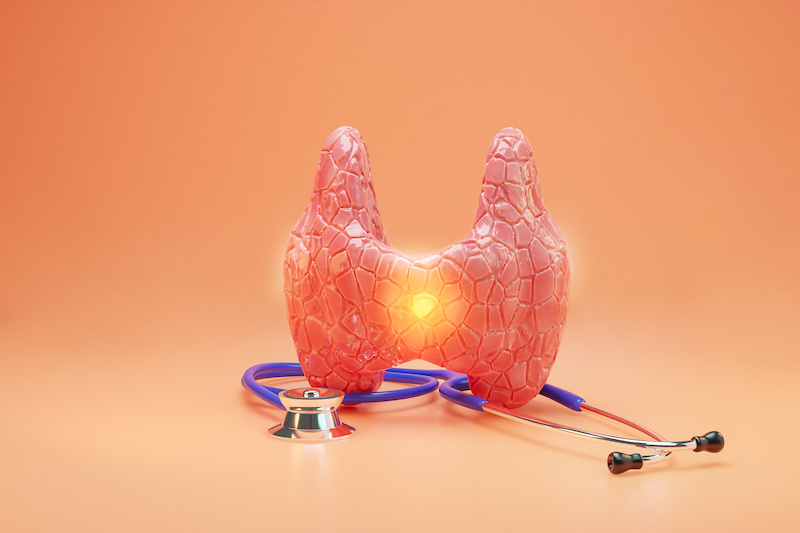
New Brunswick, N.J., September 1, 2022 – The thyroid is a small organ with a large impact. It is a butterfly shaped gland at the base of your neck that produces a hormone that helps control your body's metabolism. Thyroid conditions are a very common health issue in the United States, with about 20 million Americans living with a thyroid disease of some kind according to the American Thyroid Association, and up to 60 percent of those with thyroid disease unaware of their condition. Thyroid cancer occurs when a cell in your thyroid undergoes mutations, causing the cells to grow and multiply rapidly. The American Cancer Society’s most recent estimates predict that about 43,800 cases of thyroid cancer will be diagnosed this year. While thyroid cancers and other conditions are common and treatable, there are many misconceptions about thyroid health.
Amanda M. Laird, MD, FACS, chief of Endocrine Surgery and Toni Beninato, MD, MS, FACS, endocrine surgeons at Rutgers Cancer Institute of New Jersey, the state’s leading cancer center and only NCI-designated Comprehensive Cancer Center together with RWJBarnabas Health, and faculty in the Department of Surgery at Rutgers Robert Wood Johnson Medical School, answer some common questions.
Why is the thyroid so important?
The functionality of the thyroid gland will affect your body’s overall wellness. Your thyroid gland is responsible for manufacturing enough thyroid hormone to regulate vital functions like breathing, heart rate and body weight.
Does having an overactive thyroid gland (hyperthyroidism) or an underactive thyroid gland (hypothyroidism) increase a person’s chance of developing thyroid cancer?
No, it does not.
When should you see a doctor for thyroid cancer symptoms?
Most thyroid cancers do not cause symptoms, therefore, the only thing you may notice is a lump or mass in your neck. If you notice a new or growing lump, you should see your doctor who can run additional tests to identify the cause and determine what is wrong.
How do I know if it’s something serious?
Any neck mass should be evaluated by your doctor to determine what the next steps for testing will be.
What is a thyroid nodule and how is it different from thyroid cancer?
A thyroid nodule is a mass or lump in the thyroid which can either be benign or cancerous. Many thyroid nodules require a biopsy to determine if it is a benign thyroid nodule or a thyroid cancer.
Does thyroid cancer have any symptoms in the early stages?
The most common symptom of thyroid cancer is a painless lump or swelling that develops in the neck. Most thyroid cancers do not cause symptoms. Rarely, very advanced thyroid cancer can cause symptoms which may include unexplained hoarseness or difficulty swallowing that does not go away.
Are there any alternative treatments for thyroid cancer besides surgery?
Surgery is the typical treatment for thyroid cancer. This may include removing half or all of the thyroid. Some patients may need additional treatment with radioactive iodine (RAI) therapy.
Why is thyroid cancer more common in women than men?
Research shows that thyroid cancer diagnoses have spiked for U.S. women over the last decade. The reasons for this are still unclear, but researchers are looking at the relationship between thyroid cancers and the role of hormones.
Why do people refer to thyroid cancer as “the good cancer?”
Many people know thyroid cancer as a cancer type with a good prognosis, but like all cancers, thyroid cancer requires close monitoring after treatment.
Is there anything I can do to maintain my thyroid health?
Staying educated about thyroid issues, doctor visits and the right lifestyle can help you maintain your thyroid health. The best way to determine if you have a thyroid condition is to consult your physician as soon as possible if you feel that something is wrong. If you feel any new lumps, tell your doctor.
###
For journalists – contact:
Krista Didzbalis
Media Relations Assistant
732-507-8307
krista.didzbalis@rutgers.edu
For patient appointments/inquiries – contact:
844-CANCERNJ (844-226-2376)

